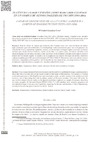Please use this identifier to cite or link to this item:
https://accedacris.ulpgc.es/jspui/handle/10553/114232
| DC Field | Value | Language |
|---|---|---|
| dc.contributor.author | González Cruz, María Isabel | en_US |
| dc.date.accessioned | 2022-03-29T07:19:58Z | - |
| dc.date.available | 2022-03-29T07:19:58Z | - |
| dc.date.issued | 2021 | en_US |
| dc.identifier.issn | 2386-6837 | en_US |
| dc.identifier.uri | https://accedacris.ulpgc.es/handle/10553/114232 | - |
| dc.description.abstract | Tanto los relatos de viajeros que visitan las islas Canarias como otros textos de ficción de autores anglo-americanos que están ambientados en el archipiélago suelen caracterizarse por el uso de hispanismos. La inserción de voces y expresiones españolas, canarias, en sus discursos en lengua inglesa constituye un recurso narrativo que cumple diversas funciones, siendo una de ellas la de ejercer como marcadores culturales de la identidad hispana. En este trabajo llevamos a cabo una revisión de los resultados obtenidos hasta ahora en nuestros estudios del vocabulario español (y canario) que se emplea en una muestra del corpus de novelas románticas inglesas compilado para el Proyecto de Investigación FFI2014-53962-P. Ofreceremos una síntesis de los aspectos semánticos, pragmáticos y lexicográficos más destacables de estos hispanismos, su categorización y funciones, centrándonos especialmente en su papel como marcador cultural en los textos. | en_US |
| dc.description.abstract | One common feature of both travel accounts and fictional works published by Anglo-American authors who either visit or set their plots in the Canary Islands is their usage of Hispanicisms. The insertion of Spanish words and expressions in their English discourse constitutes a useful narrative resource which performs several functions, one of them being their role as cultural markers of Hispanic identities. This essay will revise the main results obtained after my studies on the Spanish vocabulary employed in a sample of romances taken from the corpus compiled for Research Project FFI2014-53962-P. I will underline those semantic, pragmatic and lexicographical aspects that seem most significant, regarding the features and functions of those Hispanicisms, focusing on the role they play in the texts as cultural markers. | en_US |
| dc.language | spa | en_US |
| dc.source | Coloquio de Historia Canario-Americana [ISSN 2386-6837], v. XXIV-088, p. 1-14, (2020) | en_US |
| dc.subject | 5701 Lingüística aplicada | en_US |
| dc.subject | 6202 Teoría, análisis y crítica literarias | en_US |
| dc.subject.other | Hispanismos | en_US |
| dc.subject.other | Léxico canario | en_US |
| dc.subject.other | Marcador cultural | en_US |
| dc.subject.other | Novela romántica | en_US |
| dc.subject.other | Canarias | en_US |
| dc.subject.other | Hispanicisms | en_US |
| dc.subject.other | Canarian lexicon | en_US |
| dc.subject.other | Cultural markers | en_US |
| dc.subject.other | Romance fiction | en_US |
| dc.subject.other | Canary Islands | en_US |
| dc.title | El léxico canario y español como marcador cultural en un corpus de textos ingleses de ficción (1955-2004) | en_US |
| dc.title.alternative | Canarian Spanish lexicon as a cultural marker in a corpus of English fiction texts (1955-2004) | en_US |
| dc.type | info:eu-repo/semantics/conferenceobject | en_US |
| dc.type | ConferenceObject | en_US |
| dc.relation.conference | XXIV Coloquio de Historia Canario-Americana | en_US |
| dc.investigacion | Artes y Humanidades | en_US |
| dc.type2 | Actas de congresos | en_US |
| dc.description.numberofpages | 14 | en_US |
| dc.utils.revision | Sí | en_US |
| dc.identifier.ulpgc | Sí | en_US |
| dc.contributor.buulpgc | BU-HUM | en_US |
| item.grantfulltext | open | - |
| item.fulltext | Con texto completo | - |
| crisitem.event.eventsstartdate | 30-11-2020 | - |
| crisitem.event.eventsenddate | 03-12-2020 | - |
| crisitem.author.dept | GIR Estudios sociolingüísticos y socioculturales | - |
| crisitem.author.dept | Departamento de Filología Moderna, Traducción e Interpretación | - |
| crisitem.author.orcid | 0000-0002-6815-2743 | - |
| crisitem.author.parentorg | Departamento de Filología Moderna, Traducción e Interpretación | - |
| crisitem.author.fullName | González Cruz, María Isabel | - |
| Appears in Collections: | Actas de congresos | |
Page view(s)
54
checked on Jan 11, 2026
Download(s)
20
checked on Jan 11, 2026
Google ScholarTM
Check
Share
Export metadata
Items in accedaCRIS are protected by copyright, with all rights reserved, unless otherwise indicated.
